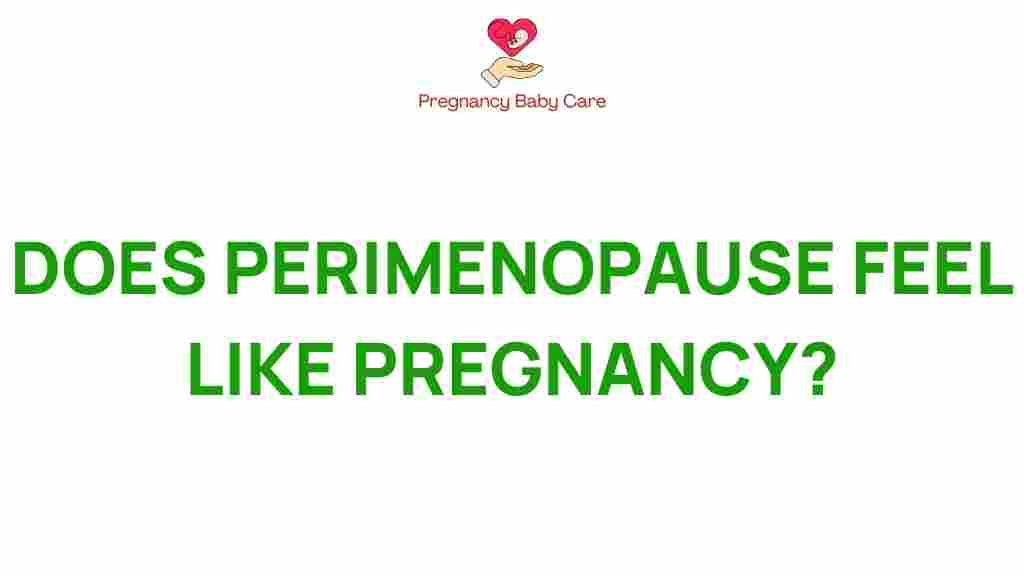Is Perimenopause the New Pregnancy? Understanding the Similarities
As women transition through different stages of life, they encounter various physiological changes that can sometimes feel overwhelming. One such transition is perimenopause, a phase leading up to menopause that brings about numerous symptoms and hormonal changes. Interestingly, some of the experiences during perimenopause can parallel those of pregnancy. In this article, we will unpack the similarities between perimenopause and pregnancy, focusing on the symptoms, emotional fluctuations, and health implications involved in this significant transition in women’s health.
Understanding Perimenopause
Perimenopause is the transitional phase before menopause, typically starting in a woman’s 40s but can begin earlier for some. During this time, the ovaries gradually produce less estrogen, leading to various physical and emotional changes. The duration of perimenopause can vary, lasting anywhere from a few months to several years.
The Symptoms of Perimenopause
Just as pregnancy comes with a host of symptoms, so does perimenopause. Here are some common symptoms:
- Irregular menstruation: One of the first signs of perimenopause is changes in the menstrual cycle, including skipped periods or heavier/lighter flows.
- Hot flashes: Sudden feelings of heat, often accompanied by sweating, are common and can disrupt daily activities.
- Sleep disturbances: Many women experience insomnia or disrupted sleep patterns during this transition.
- Mood swings: Emotional fluctuations can be significant, similar to those experienced during pregnancy.
- Fatigue: A general sense of tiredness or lack of energy can occur.
- Vaginal dryness: Reduced estrogen levels can lead to dryness and discomfort during intercourse.
Comparing Hormonal Changes in Perimenopause and Pregnancy
During both perimenopause and pregnancy, women experience significant hormonal changes. In pregnancy, hormonal levels, particularly of progesterone and estrogen, increase to support fetal development. Conversely, in perimenopause, estrogen levels decline, leading to various physical and emotional symptoms.
This fluctuation in hormones can lead to:
- Emotional fluctuations: Women may feel euphoric one moment and irritable the next, similar to mood swings in pregnancy.
- Physical symptoms: Both conditions can lead to fatigue, nausea (though more common in pregnancy), and sensitivity in the breasts.
Health Implications of Perimenopause
The health implications of perimenopause are profound, affecting not just reproductive health but overall well-being. Similar to pregnancy, this phase requires attention to health and lifestyle choices.
1. Managing Symptoms
Women experiencing perimenopause can adopt several strategies to manage their symptoms:
- Healthy diet: Eating a balanced diet rich in fruits, vegetables, whole grains, and lean proteins can help mitigate symptoms.
- Regular exercise: Engaging in physical activity can boost mood, help with sleep, and reduce hot flashes.
- Stress management: Techniques such as yoga, meditation, or deep-breathing exercises can alleviate emotional fluctuations.
- Consulting healthcare professionals: Discussing symptoms with a doctor can lead to potential treatments, including hormone therapy.
2. Importance of Regular Health Check-ups
Regular health check-ups during perimenopause are crucial. Women should have discussions with their healthcare providers on:
- Screening for bone density to prevent osteoporosis.
- Managing cardiovascular health, which can be impacted by hormonal changes.
- Addressing any psychological impacts, including anxiety and depression, which may arise during this transition.
Troubleshooting Common Issues During Perimenopause
Like pregnancy, perimenopause can bring unexpected challenges. Here are some common issues and troubleshooting tips:
Emotional Fluctuations
Emotional fluctuations can be distressing. Here are some techniques to manage these changes:
- Journaling: Keeping a journal can help track mood changes and identify triggers.
- Support groups: Connecting with others experiencing similar transitions can provide comfort and understanding.
- Professional help: Therapy or counseling may be beneficial for those struggling with emotional health.
Sleep Disturbances
Sleep issues can be frustrating. Here are tips to enhance sleep quality:
- Establish a sleep routine: Going to bed and waking up at the same time each day can help regulate sleep patterns.
- Create a comfortable sleep environment: Ensure your bedroom is cool, dark, and quiet.
- Avoid stimulants: Limit caffeine and electronics before bedtime.
Conclusion: Embracing the Transition
While perimenopause can feel daunting, it is a natural stage in women’s health that shares similarities with pregnancy. By understanding the symptoms and hormonal changes, women can better navigate this transition. Just as with pregnancy, support, education, and proactive health management are key to a smoother experience. Prioritizing physical and emotional well-being can make this period a time of growth and self-discovery, rather than discomfort.
For more information on women’s health and managing perimenopause, consider visiting this resource. Additionally, if you’re interested in exploring more about pregnancy and its stages, check out this informative site.
This article is in the category Health and created by PregnancyBabyCare Team
